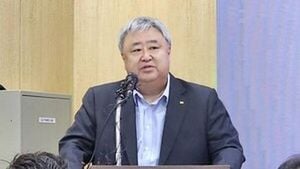Over the past decade, the quality of English instruction in Vietnamese schools has shown significant improvement, according to GS, TS Lê Anh Vinh, the Director of the Vietnam Institute of Educational Science. He emphasizes that to elevate students' foreign language skills, educational approaches must extend beyond merely stating that "English is an important subject." Instead, they need a practical focus and an enhanced teaching quality, particularly in a global context where foreign languages serve not only as communication tools but also as gateways to knowledge.
To realize these goals, Trần Thế Cương, the Director of the Hanoi Department of Education and Training, has shared that hundreds of teachers with robust language skills have been sent abroad for training and exposure to advanced educational practices in countries recognized for their strong education systems. After their return, these teachers formed clubs to continue training and capacity-building for their peers in outlying areas.
“The education sector must prioritize the development and improvement of qualifications among teachers in other subjects, so they can teach languages alongside mathematics and natural sciences,” said Cương, drawing attention to the holistic integration of English into the curriculum.
Moreover, the aspirations don’t stop here. TS Nguyễn Thị Mai Hữu, Head of the National Foreign Language Project Management Department at the Ministry of Education and Training, outlined a vision for 2045: a future where English will serve as a second language in schools, enabling smoother teaching of other subjects and maximizing everyday communication in educational environments.
Achieving this ambition, however, is not without its challenges. Lê Thị Thanh Huyền, a teacher at Châu Sơn Primary School in Hanoi, put forth a vital insight: “Implementing English as a second language in schools is entirely feasible but requires a comprehensive long-term plan and the cooperation of numerous societal resources, with English teachers at the forefront.”
To ensure that educators are prepared for this transition, Huyền advocates for specialized training programs focusing on teaching cultural subjects in English. This aligns with the urgent need for a bilingual education framework within Vietnamese schools.
However, TS Trần Thị Lan Anh, a lecturer at the University of Languages and International Studies (Vietnam National University), cautions that without an overhaul of assessment and evaluation methods, teachers’ approaches will remain stagnant. She calls for improvements in teachers' communication skills and pronunciation, advocating for additional financial support and certifications to recognize their development efforts.
Furthermore, TS Nguyễn Thu Lệ Hằng, also a lecturer at the same institution, highlights the importance of enriching student engagement in the learning process. She urges educators to adopt interactive learning models, including debates and presentations, which can stimulate students’ usage of language in real-life contexts.
In addition to traditional classroom strategies, there's a strong push toward leveraging Artificial Intelligence (AI) to bridge educational gaps for students from various regions—particularly those from disadvantaged backgrounds. By developing online platforms, the aim is to ensure every student, even those studying abroad, has access to quality English instruction.
The call for change is strong. The Vietnamese education system is at a crossroads, requiring an enduring commitment from teachers, families, and the entire educational framework to revamp teaching methodologies and enhance student learning outcomes. As schools navigate this critical transition, Cương emphasizes, "We cannot let parents and students judge our teachers for incorrectly pronouncing words. It's imperative for our teaching staff to continuously strive for knowledge enhancement to excel in their specialty and pedagogical methods.”
To undertake such a transformative journey, collaborative efforts among different educational stakeholders—teachers, parents, policymakers, and community members—are essential. As pointed out by education leaders, when English language gains a solid foothold as a means of communication, it will undoubtedly create broader opportunities for Vietnamese students to excel and establish a distinctive presence on the global stage.
In summary, the initiative to integrate English as a second language within Vietnamese schools marks a pivotal step towards fostering international competence among students. The road ahead, while challenging, is filled with immense potential for enriched educational practices and enhanced global engagement for the future generation.





